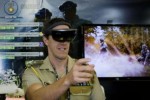Search
Using the filters to the left, click your selection, it will become bold and filter the results, click it again to remove that filter.
An Army in Motion It is my great privilege to be your Chief of Army. The Army of today is in great shape and will continue its journey of improving and adapting. There is always more to do as the context and needs of the future continually change. We are an Army in motion. Here I outline my initial approach for thinking about ourselves. I invite you to engage with and help further develop these ideas, framed around four command themes: Preparedness, People, Profession and Potential. Australia’s Army The …
Network-centric warfare (NCW) is becoming the dominant logic of current and future military operations. Network-enabling technologies bring with them a dramatic increase in the quantity of information, the need for constant interaction and a demand for greater organisational transparency. These network characteristics will raise important questions about the cultural assumptions held by the Australian Defence Force (ADF) and the wider Department of Defence. The pressure on the military workforce and the …
The Anzac tradition does not talk much about what happens when combat morale falters and battle fatigue undermines military effectiveness. Yet, despite the Australian Army's proud history, it has not been immune from such problems. Evidence of this is not, however, likely to be found in any official history or unit report. Fortunately, the 7th Australian Infantry Brigade's campaign on Bougainville, 1944–45, allows these issues to be studied in detail. The existence of candid personal diaries and memoirs …
The Chief of Army, Lieutenant General Angus Campbell, AO, DSC, has now endorsed a new Professional Military Education (PME) Strategy for Army. This Strategy lays out the argument for an intellectual edge, and then directs the ends, ways and means that will be used to achieve it. 22 November 2017 ‘In April 2016 the Chief of the Australian Army commissioned the Ryan Review , a root and branch review of Army’s education, training and doctrine system. The Review concluded that the Australian Army faced a …
How can a large organisation, deeply rooted in tradition, order, and control, purposefully embrace change? Add to this eternal test the complexity of rapidly evolving technology and the challenges compound. The ability of the Australian Defence Force (ADF) to master the technologies associated with network-centric warfare (NCW) will largely shape its destiny. The implementation of NCW cuts deep, right to the organisational, social and cultural roots that underpin the entire Defence organisation. NCW …
Like other Western military forces, the ADF has used deployments since Vietnam to develop appropriate mechanisms to support media access to its operations. The ADF’s advances in this regard, like those of the US and UK, are almost solely linked to political and strategic direction issued on the cusp of operational deployments requiring last-minute adjustments to policy, procedures and processes. The nature of the ADF’s recent commitments to larger, long-term coalition operations has allowed commanders and …
There is need for the Australian Army and its logisticians to address the transformation of its logistics capabilities, concepts and processes. This is not only because Army must look to the future and the ever-changing face of war, nor is it because of revelations gained through nearly twenty years of operational experiences. It is not simply because the Chief of Army, Lieutenant General Angus Campbell, directed his senior logisticians to lead a ‘revolution’ in late 2016 or that Army’s balance of forces …
As the Australian Army seeks to understand the institutional lessons of its last 15 operationally intensive years, it is timely to examine the concept of expeditionary warfare — an idea fundamental to the Australian approach to war. This examination becomes increasingly necessary as Defence progresses in its development of Australia's 'Maritime Strategy', a strategic policy approach based upon an operational concept proposed to Sir Julian Corbett in 1914. Expeditionary warfare is a contentious idea and …
Adaptive Campaigning - Future Land Operating Concept (AC-FLOC), replaces Complex Warfighting 04 and Adaptive Campaigning 06 as a single, holistic document. It is Army's new capstone concept. By identifying and analysing the challenges of current and emerging operating environments, in conjunction with guidance from the Defence White Paper 2009 and the Adaptive Army initiative, AC-FLOC describes actions of an integrated Joint Land Force response, as part of the whole-of-government approach to the demands …
Generalship is an intellectual endeavour; generals must understand the character of war and create a vision of success. They must be resolute in their commitment and bold in their execution to achieve this success. But, they must also never let go of their humanity, their compassion for innocent civilians, their own soldiers and even the enemy. In the abstract, this seems straightforward, but on the ground when you are exhausted, when information is confused and you are being shot at, even straightforward …


